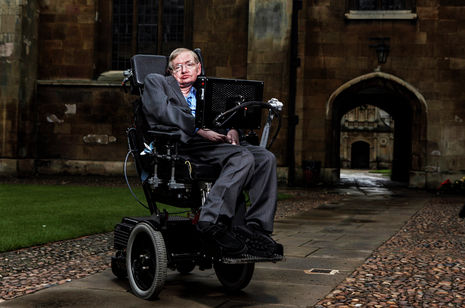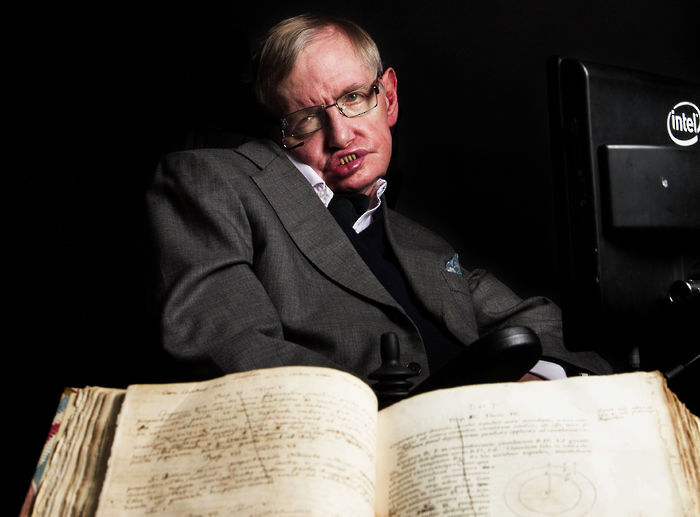Applications open for first Stephen W. Hawking Professorship of Cosmology
The University is welcoming applications to the Professorship, which was announced in 2014, for the first time

The Stephen W. Hawking Professorship of Cosmology has opened applications for 2021. This is the first year the position has been advertised for election to the Chair.
The Professorship was confirmed by the Regent House in 2014 to much controversy over fair pay and the influence of private donors. The Professorship was created through the funding of the Avery-Tsui Foundation to honour the legacy of the late Professor Stephen Hawking, who was a member of the Department of Applied Mathematics and Theoretical Physics (DAMTP) for 40 years.
Hawking worked as Lucasian Professor of Mathematics from 1979-2009 and Director of Research from 2009-2018.
“This is a high profile role intended to take forward Professor Hawking’s monumental legacy in cosmology and gravitation, helping to ensure the continuation of Cambridge’s long and remarkable history in these areas,” Professor Colm-cille Caulfield, Head of DAMTP, told Varsity.
“The Department of Applied Mathematics and Theoretical Physics is particularly excited to be recruiting to this prestigious chair position as it will give us an opportunity to build on Professor Hawking’s inspiring legacy,” he continued.
Within DAMTP, he played a key role in maintaining and building our worldwide reputation in gravitation and cosmology, as is reflected by a constant influx of postdoctoral fellows and visiting scientists each year and by the large number of talented students enrolling in our Master’s Degree (Part III) and PhD programmes.”
The Advisory Committee to the Professorship invites applications from people “whose work falls within the broad field of cosmology,” ranging from “the analysis as to the origins of matter and of the universe, theoretical cosmology and gravitation, and all other fields of academic scholarship as may from time to time be generally considered cosmology and theoretical physics.”
Candidates will start the Professorship from 1st October 2021 or as soon as possible thereafter.
Candidates must hold a PhD or equivalent postgraduate qualification. They must also “have the vision, leadership, experience and enthusiasm to build on current strengths in maintaining and developing a leading research presence,” as stated in information released by the Department of Applied Mathematics and Theoretical Physics.
The Professor will be responsible for giving lectures and holding classes for typically one undergraduate and one graduate-level course in applied mathematics and theoretical physics. They will also be expected to undertake original research and the supervision of research in their subject and Faculty/Department.
“The Department would particularly welcome applications from women, since women are, and have historically been, underrepresented on our academic staff,” the DAMTP stated.
“The Department is also keen to attract applications from candidates who have a genuine interest in, and commitment to, developing the role of women in Mathematics and who can demonstrate the potential to be strong role models to female mathematicians.”
Applications will remain open until the 12th April 2021.
The appointment to the Professorship will be made by the General Board of the Faculties on the advice of an Advisory Committee chaired by the Vice-Chancellor or his Deputy. Shortlisted candidates may be invited to give a seminar on their work and meet prospective colleagues in their Faculty/Department.
The tenure of the Professorship of Cosmology is limited by statute to seven years. There is also the possibility of re-appointment for a further two terms of five years each.
“This timely recruitment will put us in a position to build on Professor Hawking’s exceptional academic legacy,” Professor Caulfield told Varsity.
“The new Stephen W. Hawking Professor will play a key role by providing leadership in research and teaching in cosmology and gravitation, using their expertise and enthusiasm to attract and nurture the brightest and best researchers and students from around the world.”
 News / Uni Scout and Guide Club affirms trans inclusion 12 December 2025
News / Uni Scout and Guide Club affirms trans inclusion 12 December 2025 News / Cambridge Vet School gets lifeline year to stay accredited28 November 2025
News / Cambridge Vet School gets lifeline year to stay accredited28 November 2025 News / Cambridge study finds students learn better with notes than AI13 December 2025
News / Cambridge study finds students learn better with notes than AI13 December 2025 Science / Did your ex trip on King’s Parade? The science behind the ‘ick’12 December 2025
Science / Did your ex trip on King’s Parade? The science behind the ‘ick’12 December 2025 News / Pembroke to convert listed office building into accom9 December 2025
News / Pembroke to convert listed office building into accom9 December 2025








